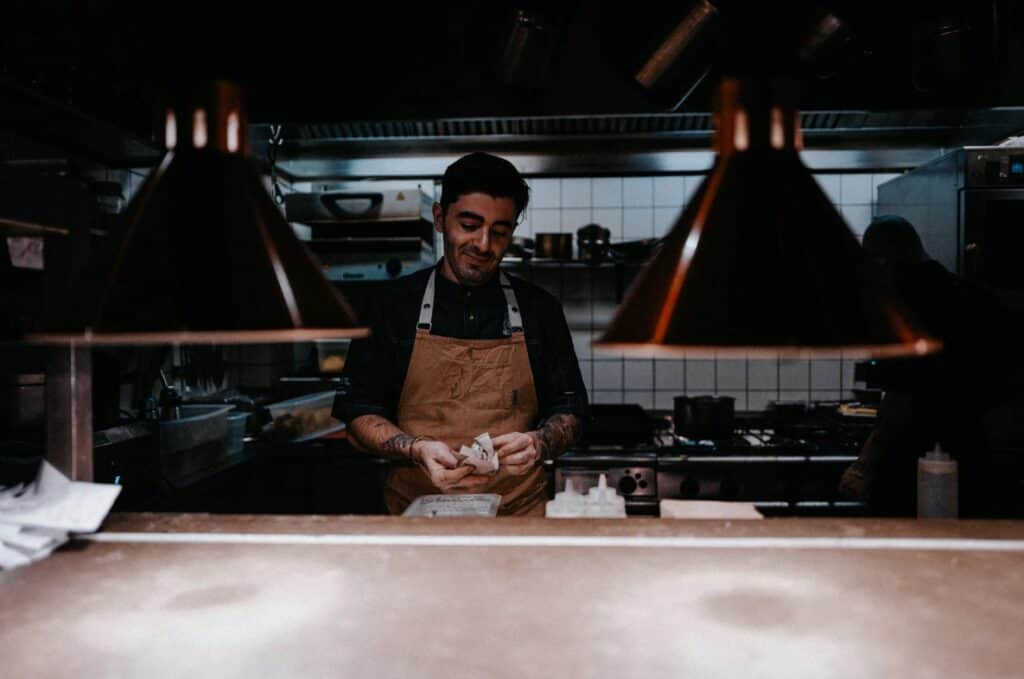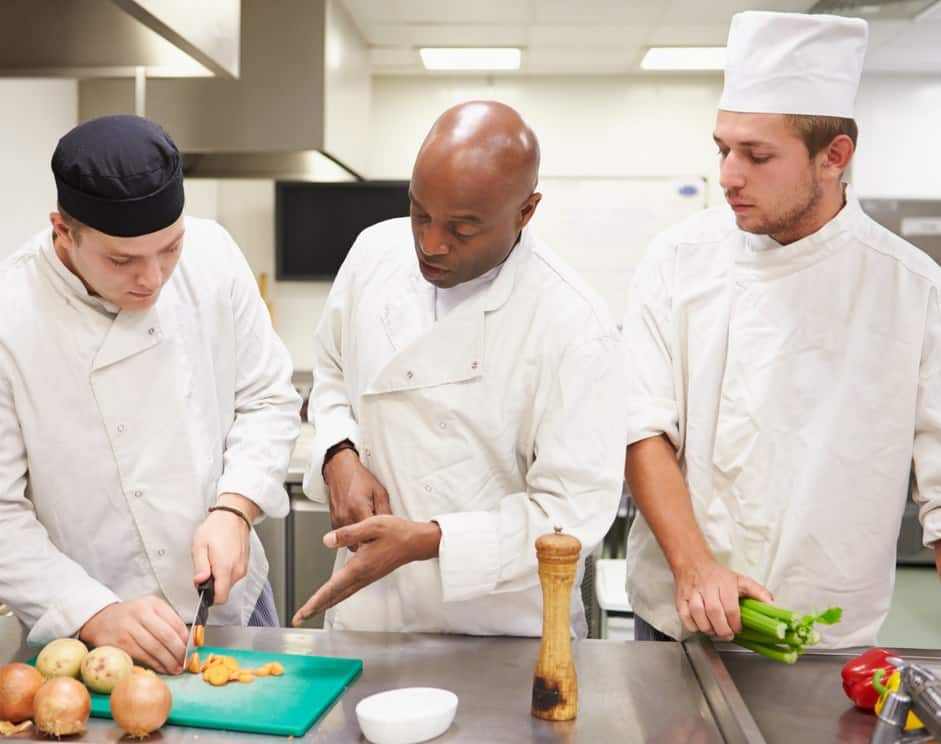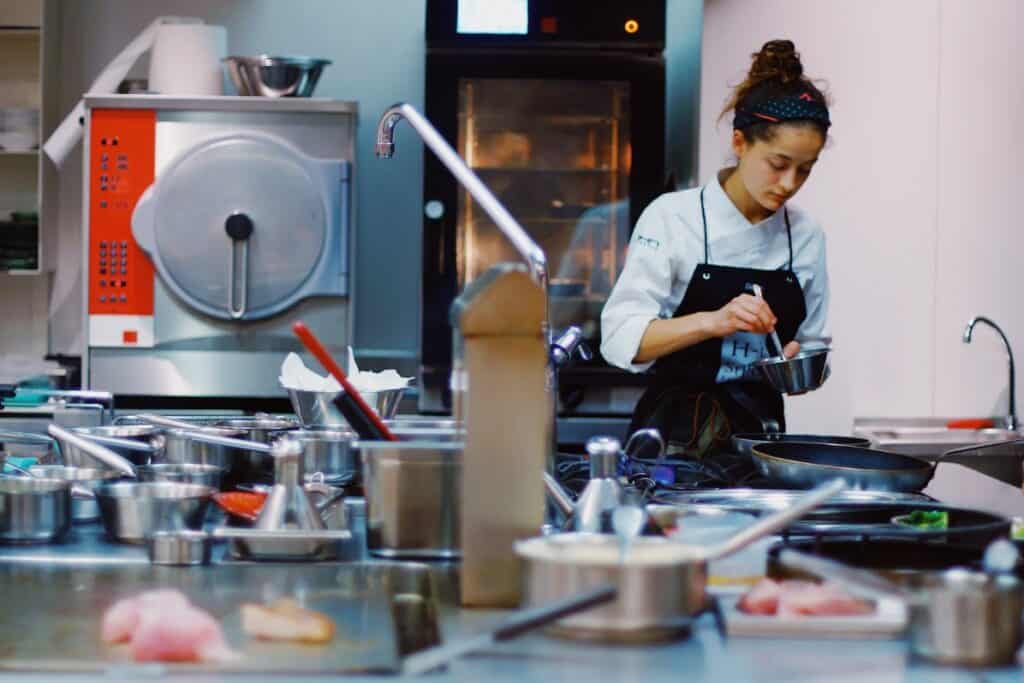- Chef de Cuisine Job Description and Responsibilities - August 10, 2021
- Executive Chef Job Description and Responsibilities - July 21, 2021
The word chef itself meant “head” in Old French, and now the role of the Executive Chef seems to be more or less the same. It’s not an easy job, and only some of the biggest restaurants even have one – but when they do it’s someone with more than just cooking skills on their resume.
Being an Executive Chef means that not only are you a master of the kitchen, but also a pro at managing and handling the kitchen team.
Many of the duties of a Chef include things that require managerial skills, like hiring and training new staff members, leading the kitchen team on hard days, and keeping the inventory full while keeping the budget in check.
Executive Chefs are usually only answerable to the owner of the establishment, and in their absence, the Head Chef takes care of leading the kitchen staff, but the position of a Head Chef isn’t one that requires managerial skills.
Here’s the job description on Indeed:
“An Executive Chef, or Head Chef, is responsible for the successful management of a restaurant’s kitchen. Their duties include designing menus, managing restaurant staff, and organizing financial budgets.”
Before we delve deeper into the duties of an Executive Chef, we need to talk about the hierarchy of a commercial kitchen in general. Then there are the expert chefs who are removed from this hierarchy and all experts in one thing or another. These chefs oversee different parts of the food preparation process and usually help the executive chef develop new dishes for the menu and then execute them.
Types of Chefs in a Commercial Kitchen
The Kitchen Hierarchy
By order of authority, here’s the basic list. This order varies in some restaurants and kitchens. For example, the Pastry Chef will have quite a bit of value in a restaurant that’s famous for its desserts. Sometimes the kitchen hierarchy isn’t strictly followed by a restaurant kitchen at all, and many restaurant owners find their own systems to make sure the kitchen runs smoothly.
In any case, the usual kitchen hierarchy has given restaurant owners a kind of structure they can depend on while bringing on new talent. Here are all the chef positions that fall under the authority of the executive chef:
- Chef de Cuisine or the Head Chef is usually the one in charge of the menu and the kitchen in general in the absence of an executive chef position. In that case, the owner themself has a more managerial role in the restaurant and the Head Chef handles all food related things. In many cases, the terms Head Chef and Executive Chef are used interchangeably, but a lot of people like to differentiate between the roles.
- Sous Chef or the Deputy Chef answers to the Head Chef in all matters kitchen related and is more involved in the day to day affairs of the kitchen. If the Executive chef and the Head Chef are the top management in the kitchen, you could say that the Sous Chef was middle management.
- Chef de Partie or Station Chefs are the people who prepare the food that goes out to the customers in a restaurant. There are multiple station chefs who are all in charge of a single station, each station being in charge of a certain food category. Station chefs are usually supervised by the specialist chefs, we’ll talk about them in a few minutes.
- Commis Chef or Junior Chefs are there to learn. Most commonly, they’re either culinary arts students hoping to gain some experience or inexperienced newcomers in the food industry.
Expert Chefs

Apart from the usual line up, restaurants will have some specialist chefs who are all an expert in their own areas. These chefs assist in menu creation and oversee different stations, but don’t come under the regular hierarchy.
- Pastry Chef or Patissier: These chefs are responsible for all the desserts, bread, cakes, and pastries being made in the establishment. Depending on the type of restaurant it is, the Patissier can be one of the most important people in the kitchen.
- Sauce Chef or Saucier: The Sauce Chef is responsible for cooking all the sauces, soups, and gravies that go with all the food in a restaurant. This is usually the part of a dish that ties it all together, which is why the sauce chef usually places great importance on flavor notes and what goes into a pot they’re cooking. They’re usually very important parts of the staff in a French restaurant.
- Meat Chef or Rotisseur: The meat chef is in charge of cooking all the meats in a restaurant by methods like grilling, boiling, or roasting them.
- Pantry Chef or Garde Manger: If you’ve ever been to a high-end buffet, you’ll have noticed lots of fruits or vegetables in the arrangement that are cut up in intricate patterns. Chances are, a pantry chef was behind those arrangements. They’re in charge of all the cold cuts, salads, cheeses, and salad spread on a menu.
- Apart from these chefs, a restaurant kitchen also has a fry chef, a vegetable chef, fish chef, a grill chef, and sometimes even a butcher chef.
Duties of an Executive Chef
I’ve mentioned before that an Executive Chef is both a manager and a food expert. That’s because being an Executive Chef is pretty much as much about leading the kitchen and looking after its managerial tasks as it is about planning the menu, developing new recipes, and running the whole establishment. As an executive Chef, you would be expected to do the following:
- Hiring and training new chefs
- Coming up with new dishes for the menu that keep customers returning to taste them
- Developing the menu and deciding how each menu item will be priced
- Coming up with an overall plan for the restaurant and decide long term goals for it, then make sure those goals are met
- Working with other departments in the restaurant like the finance department, the cleaning staff, the interior designers, and managers to make sure that their vision for the restaurant is executed smoothly outside the kitchen as well as inside it
- Training the staff and teaching them how to prepare the new dishes on the menu
- Keeping stock levels consistent and sourcing fresh ingredients from the proper places
- Ensuring that hygiene standards are being met or exceeded
- Taking responsibility for all kitchen operations and that the proper procedures are being followed – if anything goes wrong under their watch, they will answer for it
- Ensuring the kitchen is stocked with all the right equipment and utensils
- Motivating the kitchen staff on challenging days
- Ensuring customer satisfaction and consistency in the restaurant’s performance
- Navigating change within the workplace and making sure things run smoothly while expanding the restaurant
Many things that an executive chef might be expected to do, though, are not part of the usual job description. Executive chefs are usually people who’ve been in the industry for at least a decade, and many times they rely on their own personal contacts and the professional relationships they have maintained over this time to make the restaurant a success. This is why you need a very particular mixture of skills to be successful as an Executive Chef – let’s talk about them.
What Skills Does an Executive Chef Have?

The problem with centering our whole discussion around the job description is that what the Executive Chef actually does in the kitchen goes way beyond those things. Plus, all kinds of places hire Executive Chefs, from the White House to cruise ships and casinos.
The job is dynamic, ever-changing, and understanding it involves a much more detailed discussion than just a glimpse over some bullet points. If we want to really get an idea of all the things an Executive Chef does, we’ll have to take a look at all the skills they usually need to navigate their position successfully.
Once you’re done reading this section you’ll have a much better idea of how crucial Executive Chefs are to the restaurants they run. In many cases, they’re what makes a restaurant successful and you can’t separate one from the other.
Knowledge About Health Regulations
This is something that every culinary arts student is taught during their time in college. But when you’re just starting out, all you have to do is focus on keeping stuff clean, cooking it thoroughly, and following any other instructions you may have been given.
As an Executive Chef, you’re in charge of making sure all safety regulations are met and exceeded, that all the food is sourced from the right places, all the people working in your kitchen are licensed and trained to use the equipment they’ll be working with, and more.
This is why knowledge about health and safety regulations is one of the most important skills an Executive Chef can have. One wrong move, one rule violated, and your restaurant could be in serious trouble.
Recipe Development and Creation
This sounds like something simple, but in fact, there’s a whole science to recipe creation. Anyone who hopes to succeed in the food industry needs to be more than just good at cooking the same old dishes.
If you have something unique to offer, like your own unique cooking style, taste, a popular signature dish, or your own special touch to things, you have more chances of making yourself and your restaurant a success. This is why recipe creation and development are highly valued skills to have not just as an Executive Chef but as a chef in general.
Sourcing Rare Ingredients
This sounds simple but it’s not. Take morels, for example, they’re a rare edible fungus that grows in the wild at the start of spring every year. It can’t be farmed, it can’t grow at any time of the year apart from spring, and the tricky part is that they look incredibly similar to another type of fungus that grows around the same time of the year, in the same places, and is poisonous.
People who know where to find morels go out every year to gather them, which makes them super expensive and hard to buy. Couple that with their rich, earthy flavor, and you have a food item that’s very in demand when spring rolls around the corner.
For a restaurant that serves these dishes, it would be an executive chef’s job to get them when the time comes, and for that, they may have a long-standing relationship either with someone who gathers morels or sells them.
Training Personnel

At least at the start, an executive chef might be expected to show new chefs how things work around the kitchen and oversee their training process. For many chefs hired for a specialist chef job or one of the more important roles in the kitchen, the executive chef might personally see to their training.
The Executive Chef is also continuously responsible for the training and development of the kitchen staff in general, which might include making sure they’re trained to use any new equipment brought into the kitchen, aware of any regulations that change, and can keep up with changing trends in the food industry itself.
Take desserts for example – there are new cake trends and cooking methods being developed and popularized all over the world, and it’s only gotten faster now that you throw social media into the mix. It would be an Executive Chef’s job to make sure their dessert team can deal with requests for Geode cakes and gravity-defying masterpieces along with the usual stuff.
Leadership
Executive chefs are responsible for setting a vision for the restaurant they run and helping the kitchen staff navigate the challenges that fall in the way of making these goals a reality. This requires leadership, self-confidence, and the ability to make sure your staff can depend on you to take charge when things are tough.
Financial Management
Running a restaurant is more than just food. It would be the executive chef’s duty to develop the menu and determine how much each item on it costs. This means that executive chefs need to have at least some financial education experience with running a business’s finances.
They can team up with the restaurant’s financial heads or an accountant to make sure everything is going on track, but they’ll still need financial management skills to make sure the pantry stays full but within budget.
Delegating Tasks
No one likes a leader who insists on doing everything on their own, and it’s quite impossible for an Executive Chef to be down in the kitchen cooking all the time while administrative tasks need to be done. One of the most important skills people in the upper management of almost every business have is the ability to delegate tasks to other people and see them to completion.
As an executive chef, you’re in charge of the kitchen and it would be your job to know the strengths and weaknesses of each of your employees, and then to play them to your and the restaurant’s advantage.
Budget Control
This is quite similar to financial management. Executive Chefs can’t spend too much on inventory stocking, buying equipment for the kitchen, or any other expenses throughout the restaurant. Oftentimes, they have to strike deals with suppliers and strive to minimize expenses while not compromising on the quality of the ingredients they’re getting.
Maintaining Professional Relationships
We’ve mentioned this before a couple of times, but an executive chef needs to know how to maintain professional relationships. It’s one of the soft skills that no one is going to actually measure or ask about, but it’s one of the things you’ll need to be successful in the culinary art industry.
It’s not just about the Morels, it’s about the best deals for inventory, being the first one to know about a rare ingredient being for sale, getting your hands on things that would give your restaurant something other restaurants won’t have, and more.
Motivating the Team
Kitchen hours are hectic, exhausting, and crazy. Chefs often feel unmotivated and exhausted, especially on extra busy days like weekends and the holidays. It’s the Executive Chef’s job to motivate their team on days like this to keep working and make it till the end of the day.
Critical Thinking
It takes a strategic mind and a keen business sense to be able to analyze industrial data from various sources, the feedback you get from the restaurant’s customers, and to gauge how your current policies are changing and then using that data to make sound business decisions.
Part of an Executive Chef’s job is to continuously analyze that data and steer the ship in the right direction based on your conclusions. It’s not only about doing damage control when sales drop or competition arises but seeing those things happening before they do and working to prevent them.
Communication

This is one of the most important skills at any job, but it’s never more important when you’re working in the service industry. Networking and maintaining professional relationships is a very important part of an Executive Chef’s career, and the ability to communicate with their employees and underlings is essential.
You need to be prepared to deal with customer queries, complaints, and ensuring the satisfaction of the more important customers. This is a skill that can be developed on your own over the years but not one that can be taught to you beyond a certain point.
How to Become an Executive Chef
It’s possible for chefs to work their way up the kitchen, but many restaurant owners prefer to hire executive chefs who’ve had some formal education, not only in cooking but in business as well. According to Chron, the most popular majors for Head Chefs are business, culinary arts, visual art, and the performing arts.
All of these things on their own are irreplaceable skills for any chef to have. Think about all the beautiful cakes you’ve ever seen – there’s no way a degree in visual arts isn’t a useful degree for someone like a Patissier to have.
The same goes for a degree in business – a couple with years of experience working in a commercial kitchen and you have the perfect blend of culinary skills and business smarts to be an Executive Chef – or even to one day own your own establishment.
CulinarySchool.org talks about how it’s a mix of professional education like a Bachelor’s, or a diploma in the culinary arts, and practical experience working in the industry that leads you to eventually land an Executive Chef position.
FAQs
Question: How many years of experience do I need to become an Executive Chef?
Answer: Executive Chefs usually have experience of anywhere from 7 to 10 years working in a professional kitchen. They need to show proven skills in at least some of the skills that would be most useful to them in their new role, like recipe creation, leading teams, management, recipe and menu creation, etc.
Question: Do I know any Celebrity Chefs who used to be Executive Chefs?
Answer: Chefs like Wolfgang Puck, Emeril Lagasse, and many others have made a name for themselves as Executive Chefs before they caught the attention of the public eye. Their roles as heads of their own restaurants were what provided them with the networking opportunities that led to them eventually becoming Celebrity Chefs.
Question: Do Executive Chefs only work in restaurants?
Answer: Not at all. Cruise ships, holiday resorts, catering companies, the White House, casinos, and even spas all have Executive Chefs running the food operation. Think about it like this – if something has a commercial kitchen, there are chances it’ll have an Executive Chef too.
Question: How much do executive chefs earn?
Answer: Executive Chefs earn an average of $63,772 /year or $31/hour according to Ziprecruiter. The estimates change from place to place, but that’s because there’s no set standard. Salaries vary depending on the type of place you’re working at, your own experience and skills, geographical location, and how well the restaurant is doing.
Question: Do I need to be working at a place for a long time to be an Executive Chef there?
Answer: A lot of restaurants and establishments hire from within, but there are places that need someone they don’t think they already have in their current staff. You could also be hired directly as an Executive Chef either at a new restaurant or one that’s expanding to new branches and wants someone who would handle the transition and make sure the quality of the products stayed consistent.
It depends on your own career path, the work environment, and where you’re hired whether it would be easier for you to achieve your career goals by staying with the same establishment over time or for you to look to be hired at a better position somewhere else.


